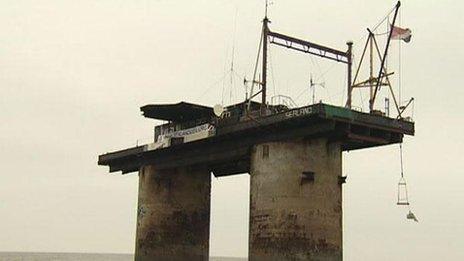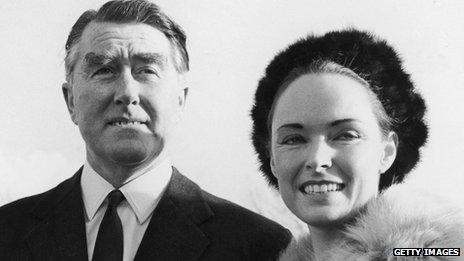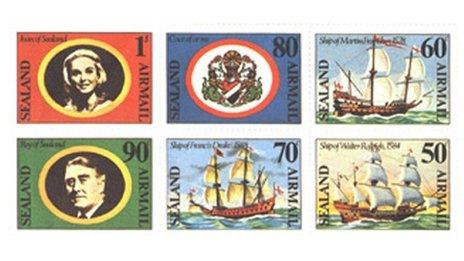Life on Sealand: Firearms, fishing and the Cosmic Sea Cat
- Published

Roy Bates declared himself monarch of Sealand in 1967
What's it like to live on Sealand, the small, self-proclaimed independent state seven miles off the Suffolk and Essex coast?
Considering the 10,000 sq ft platform has staged fights with the navy, a hostile takeover attempt and one of the pastimes there is blowing up homemade explosives you would expect it to be hectic.
But, says Mike Barrington, resident engineer and, to give him his official title, head of homeland security, it is actually "laid back" and rather "like living in the past".
Mr Barrington, 57, cannot remember the first time he met Roy Bates, the army major who claimed the former World War II fortress as his own and who died last week aged 91.
But he remembers they had a shared love of radio, hit it off instantly and during a working relationship of 25 years he came to consider Mr Bates as "like a second father".
Mr Barrington, who like Mr Bates was involved in pirate radio, spends two weeks at a time on Sealand away from his home in Mistley, Essex.
When he first went on board he found the concrete and steel construction, which hosts up to 15 people at a time, had been "cannibalised" by fishermen.
All the lead had been removed, he said, and his first job was to rewire the electrics, which run on battery power.
"It was very basic in the early days but is now very comfortable," said Mr Barrington, who added there were normally at least two people working at Sealand.

Roy Bates is survived by his wife Joan, son Michael and daughter Penny
There is no washing machine or dishwasher, so much of Mr Barrington's day is taken up with the daily chores and maintenance jobs.
"We do a bit of fishing, we've got lobster pots dotted about, do a bit of painting. It all takes time," he said.
"Everything is done in the most cack-handed long way so you don't get bored. If you're bored, get a hammer and chisel and start chiselling something or do the washing up."
Sealand is really nice in the summer but a "cold, horrible place" in the winter, Mr Barrington said.
In the past the crew have brewed their own beer and until last December when it died they had a pet cat called the Cosmic Sea Cat.
Testing explosives
Mr Barrington said he sometimes watched television while the power was turned on for cooking but otherwise spent his spare time reading technical journals.
"I keep myself amused by tinkering around with things and inventing stuff," he said.
"Getting a 45-gallon oil drum, filling it up with oxygen and acetylene and putting a detonator in there - that's what I call fun."
Mr Barrington said a recent experiment had resulted in a "very large bang" and "an awful lot of rust" falling off the fort.
In 1978, three foreign men landed at Sealand by helicopter and overpowered Mr Bates's son Michael to claim the 'principality' as their own.
Mr Bates soon arrived, took two of the men hostage and regained control of the fort.

Roy and Joan Bates featured on Sealand's stamps
Mr Barrington, who was made a citizen of Sealand before Mr Bates ceased issuing passports after 9/11, said the fort was still armed.
He spoke of his own experience in staving off perceived threats.
"I did shoot at the navy once," he said. "They wouldn't talk to us on the radio, they were trying to back a big ship up to us so we fired a few warning shots.
"I think everybody knows we're nice people really but they know full well that if they try and invade us there will be a bloodbath."
Mr Barrington said neither he nor the Bates family were "anti-Britain", despite the wrangles with the government over Sealand's status.
He considers himself to be an "Englishman through and through" and even has a photo of the Queen on the wall at home, he said.
But he admitted he was "probably a little bit more" patriotic to Sealand.
Mr Barrington said he hoped to remain in his job under the leadership of Michael Bates and still harboured hopes that Sealand would one day be recognised as a country.
As for Mr Bates senior, Mr Barrington said he would remember him for being a "true Englishman".
"He was a maverick who was prepared to stand up and take on the world."
- Published10 October 2012
- Published7 May 2012